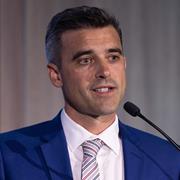
Professor Peter Macreadie
Details
-
Department: School of Science
-
Campus: City Campus Australia
-
peter.macreadie@rmit.edu.au
Open to
- Collaborative projects
- Industry Projects
- Masters Research or PhD student supervision
- Media enquiries
- Membership of an advisory committee
About
Professor Peter Macreadie is global leader in marine science and sustainability. He is the Director of RMIT's Centre for Nature Positive Solutions and Founder/Director of the Blue Carbon Lab (www.bluecarbonlab.org). Peter leads a team of scientists using nature to help mitigate climate change and promote a sustainable economy.
Peter is committed to translating science into real-world action and bringing partners along on the journey (incl. governments, corporates, traditional owners, communities). He and his team are tackling big issues facing people and planet, including: blue carbon, teal carbon, citizen science, ecosystem restoration, aquatic biosecurity, natural capital accounting, eco-tourism, biodiversity, fisheries, microplastics, seaweeds, coastal protection, and decommissioning of offshore oil and gas infrastructure. Peter’s approach to research is trans-disciplinary, spanning the fields of chemistry, ecology, social science, microbiology, environmental economics, policy, and molecular biology.
He has published >250 scientific papers, including top journals such as Science, Nature Climate Change, One Earth, Nature Ecology and Evolution, The Lancet Planetary Health, PNAS and Global Change Biology.
Peter has attracted >$35M in research funding and received >30 awards and fellowships in recognition of his and his team’s contribution to science, including: the 2023 Frontiers Planet Prize National Champion (Australia); the 2020 Premier's Sustainability Award (Victoria); the 2019 Australian Financial Review Award for Industry Engagement; the 2017 Deakin Vice Chancellor's Mid-Career Research Award; and the 2015 David Syme Prize for ‘best original research in Australia undertaken in the previous two years in Biology, Physics, Chemistry or Geology’.
UN sustainable development goals
- 13 Climate Action
- 14 Life Below Water
- 15 Life on Land
- 1 No Poverty
- 12 Responsible Consumption and Production
- 11 Sustainable Cities and Communities
Academic positions
- Professor
- RMIT University
- Melbourne, Australia
- 6 May 2024 – Present
- Professor of Marine Science
- Deakin University
- Burwood, Australia
- 1 Jan 2021 – 3 May 2024
- Associate Professor
- Deakin University
- Burwood, Australia
- 1 Jan 2018 – 31 Dec 2020
- Senior Lecturer
- Deakin University
- Burwood, Australia
- 2 Feb 2016 – 31 Dec 2017
Supervisor projects
- Enhancing Water Quality and Water Security in Agricultural Dams in Australian
- 7 Mar 2025
- Advancing blue carbon restoration for climate change mitigation
- 21 Jan 2025
- IMPROVING DECISION-MAKING PROCESS IN MANGROVE RESTORATION
- 12 Dec 2024
- Establishing Principles and Practices for Feasible and Robust Blue Carbon Projects
- 10 Dec 2024
- Quantifying the diverse benefits of large-scale coastal restoration, demonstrating the benefits of Natural Capital, in Victoria, Australia
- 6 Dec 2024
- Barriers and opportunities to blue carbon projects in the Western Indian Ocean (WIO)
- 27 Nov 2024
- Effects of Plastic Pollution on blue carbon ecosystems
- 7 Nov 2024
Research interests
Climate Change Mitigation
-
- Blue carbon ecosystems (e.g., seagrasses, mangroves, tidal marshes)
- Methane and nitrous oxide emissions from aquatic systems
- Remote sensing for blue carbon accounting
- Ocean alkalinity enhancement
Ecosystem Restoration
-
- Rehabilitation of degraded wetlands
- Innovative techniques for mangrove, tidal marsh, and seagrass restoration
- Long-term monitoring of restored ecosystems
Sustainable Fisheries and Biodiversity
-
- Fisheries enhancement from vegetated coastal ecosystems
- Low-cost biodiversity monitoring strategies
Natural Capital and Environmental Economics
-
- Valuation and accounting of natural capital
- Development of market-based blue carbon projects
- Exploring co-benefits of carbon and biodiversity credits
Decommissioning of Offshore Infrastructure
-
-
- Environmental and ecological considerations for decommissioning offshore oil and gas platforms
- Role of artificial structures in supporting marine biodiversity
- Strategies to balance ecological restoration and industrial legacy
-
Aquatic Biosecurity and Pollution
-
- Microplastics in blue carbon ecosystems
- Biosecurity measures for aquatic invasive species
Coastal Protection and Erosion Control
-
- Hybrid green-grey infrastructure for resilience
- Role of vegetation in mitigating coastal erosion
Citizen Science and Community Engagement
-
- Participatory approaches in environmental monitoring
- Climate literacy and corporate engagement
- Outreach programs to provide educational and immersive experiences
Advanced Research Techniques
-
- Use of molecular biology for carbon cycling studies
- Applications of structural equation modelling in ecosystem research